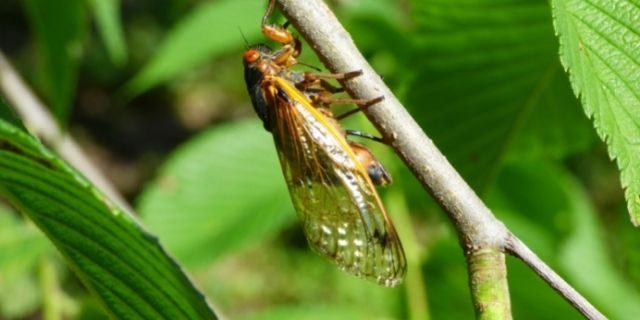05
May
U.S. Residents Urged Not to Spray Pesticides for Periodical Cicadas

(Beyond Pesticides, May 5, 2021) As periodical cicadas begin to emerge throughout the central and eastern United States, many may be tempted to put a halt to their noisy mating calls by reaching for a spray bottle of pesticide. But besides violating local noise ordinances, cicadas are relatively harmless and play a critical ecological role. Environmental organizations are urging U.S. residents and communities not to spray cicadas with pesticides, noting that pesticide hazards will last longer than Brood X cicadas.
Reports indicate that pesticide applicator groups and businesses agree that there is no need to spray for periodical cicadas. “We really want people to understand and know that pesticides are not the answer, which sounds really funny coming from a pest control company,” Frank Meek, a manager at Orkin, told CNET. “Pesticides are not the thing to use on this insect. They don’t work for it, and it’s a waste of product, and it’s a danger to the environment just to spray down because you’re afraid of the cicadas.”
But while environmental groups and frontline applicators are working to educate the public over the futility of spraying, pesticide manufacturers like Ortho are encouraging homeowners to spend their money on highly toxic and unnecessary pesticides. “Ortho Bug B Gone advertises killing cicadas using the active ingredient bifenthrin, known to cause an array of serious health and environmental impacts,” said Bonnie Raindrop, coordinator for the Maryland Smart on Pesticides Coalition. “With over 99% inert ingredients, it can include other pesticides and chemicals that have greater environment and health risks than the main active ingredient, including the forever chemical PFAS, which was recently found in mosquito control products used in Maryland and Massachusetts. [The U.S. Environmental Protection Agency] EPA said any level of PFAS is of toxicological significance.”
While bifenthrin and its class of synthetic pyrethroids pose significant dangers to the environment and human health, and have been linked to developmental problems in young children, there is growing evidence that inert ingredients are causing just as much harm, or more harm than the active ingredients in pesticide products. These toxic pesticide products can remain in the environment for months – longer than Brood X stays above ground this year.
Periodical cicadas grow up to roughly one inch in size, and have red eyes, a black thorax, and wings with orange veins. Periodical cicadas may have either a 13 or 17 year life cycle. The current Brood X, nicknamed “The Great Eastern Brood,” is the largest 17 year cicada brood, and last emerged in 2004. Cicadas spend most of their lives underground feeding on sap from tree roots. Prior to emergence, nymph cicadas will construct tunnels to prepare to emerge once temperatures have hit 64 degrees Fahrenheit. After emerging, nymphs find a location to molt one last time, shedding their exoskeleton and turning their attention to finding a mate. The loud noises produced by cicadas are solely from males, whose mating calls can reach 100 decibels. Cicadas live short lives, and most will die off by mid-July. After mating, females will seek out young trees to lay their eggs. These eggs will then hatch, and the nymphs will again bury underground to begin the cycle anew.
From the description of the cicada life cycle we can find a multitude of reasons why they should not be blanket sprayed with toxic pesticides:
- Cicadas emerge in very large numbers, and provide an abundant food source for local wildlife (and even humans!). Spraying for cicadas could put your own health at risk, and is likely to harm nontarget species as well as those that feed on contaminated cicadas.
- Cicadas dig small tunnels that help aerate soil and cycle nutrients.
- Although pesticide manufacturers are fearmongering over cicada damage to trees, they provide an important ecological role by pruning weak branches.
- When cicadas die, they release vital nutrients back into the soil, acting as a fertilizer.
- Killing cicadas will simply speed up their death before they can fulfill their biological purpose and die naturally.
Although concerns over how cicadas impact trees are overblown by the chemical industry, those with young or valuable fruit or nut trees may want to consider protecting them prior to the Brood X emergence. But protecting trees doesn’t mean spraying toxic pesticides. Cicada control netting (such as this product) have holes that can exclude cicadas from trees without any other unnecessary hazards.
“In a world where so much of the soundscape is dominated by human activity, it can be humbling to be drowned out by these strange and amazing creatures,” said Drew Toher, community resource and policy director at Beyond Pesticides. “Let’s recognize and respect the splendor of this rare event by not spraying toxic pesticides, and simply letting Brood X be.”
If your neighbors or community plan to spray for cicadas this year, educate them on the folly of that approach, and reach out to Beyond Pesticides at [email protected] to let us know. For more information on the hazards pesticides pose to wildlife, our environment, and ourselves, see Beyond Pesticides wildlife program page and the Pesticide Induced Diseases Database.
All unattributed positions and opinions in this piece are those of Beyond Pesticides











PLEASE CONTACT ACE HARDWARE WHICH HAS MANY ADS FOR POISONS WHICH WILL DO MORE HARM THAN GOOD!!
May 22nd, 2024 at 12:57 pm